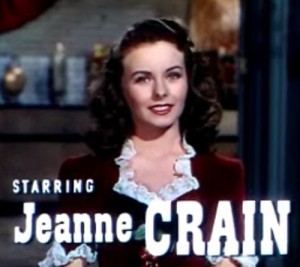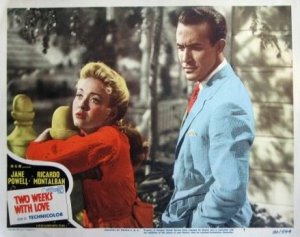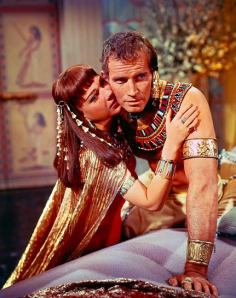There are a handful of films that I return to over and over again, particularly when I am in a rather gray mood, or just in need of some hand holding. As I’ve thought about these movies lately, I’ve realized that they are all ones that I’ve loved as a kid, and still enjoy just as much now. I am fairly uncritical of their merits as films, but rather find myself drawn in by some intangible magic (which is probably just to say that my sense of nostalgia gets the better of me sometimes). Here are just a few of them:

State Fair (1945)
For the young in heart! And romantic oldsters, too!
I was quite the connoisseur of musicals growing up, but I always maintained one rule that I believed separated the good ones from the mediocre. The number of songs couldn’t exceed five or six, because to do this immediately caused me to suspect that they served only to cover a weak plot. I still believe that I was right about that (in most cases, anyway), because my favorite musicals consistently limit their musical numbers in favor of solid plot development.
State Fair is my favorite Rogers and Hammertsein collaboration because it does not fall into the trap of the grandiose, self-important musical that I tend to detest. Margy (Jeanne Crain) and Wayne Frake (Dick Haymes) are small-town Iowans, as wholesome as apple pie and as genuine as your favorite grandmother. They come to the Iowa state fair with their parents, yearning for something new and exciting in their lives. They find love with some city folks (Dana Andrews and Vivian Blaine), and all four find time to croon their way through food, amusement rides, glittering entertainment, and the senior boar championship. State Fair is a simple story, but one that refrains from piling on the sugar in favor of something more savory and substantial. The ending may be predictable, but at least is comes across as honest rather than hackneyed or trite. And really, who can resist the infectous rhythms of “All I Owe Ioway” or “It’s a Grand Night For Singing”? You’ll be singing long after the credits roll before you even realize that real-life folks don’t spontaneously burst into song.
Two Weeks With Love (1950)
The Gayest LOVE STORY EVER FILMED!
My fondness for Two Weeks With Love is grounded in many of the same reasons I mentioned above for State Fair. The plot is fairly unassuming, but its Technicolor cheer blooms when the characters take to song and dance. Turn-of-the-century Patti Robinson (Jane Powell) has just turned 17, but can’t stand to wait another eleven months before she reaches the milestone of 18. Her mother (Ann Harding) treats her “like a child,” but “inside [she’s] a woman.” What girl can’t relate to that? Even though she sits up half the night lengthening her dresses, she’s still little Patti, a girl to be protected from “rounders” and “figure pinchers.” Sulking and mooning her way on the family’s annual two-week vacation at Kissimmee in the Catskills, she is startled and electrified when she catches sight of the dashing Demi Armendez (Ricardo Montalban). This immediately throws her into competition with the vain and preening Valerie (Phyllis Kirk), who is 18 and therefore among the “older set.” Although Valerie feigns friendship with Patti, she does everything she can to manipulate and maneuver Pattie toward humiliation so she can have Demi all to herself.
Watching the film now, I am amused at the fact that I never saw anything remotely unsettling in the fact that Patti, at 17, is smitten with a man who is at least in his mid- to late-twenties, and even goes so far as to requite her affection. In fact, I think I identified all too well with Patti. I was one of those girls who always had a crush on some teacher (usually History or English), and could not abide boys my own age. Patti’s 12-year-old sister Melba (Debbie Reynolds) echoes this age gap in her puppy love for 16-year-old Billy Finley (Carleton Carpenter), so perhaps it runs in the family. Or it could just be a girl thing. The ending, of course, is as happy as any MGM musical, and affirmed all my girlish dreams of snagging some sophisticated and worldly charmer. Patti can keep the corset, though.
 The Ghost and Mrs. Muir (1947)
The Ghost and Mrs. Muir (1947)
Is Lucy Muir’s love really a ghost, or is it a man of flesh and blood she yearns for?
The Ghost and Mrs. Muir is among my revered trinity of Gene Tierney movies (the others being Laura and Leave Her to Heaven), but unlike the other two, she does not play an alluring femme in this film. She is a widow, in fact, and leaves London with her daughter, Anna (Natalie Wood) and housekeeper, Martha (Edna Best), in order to get away from her obnoxious and self-righteous in-laws. She moves into Gull Cottage by the sea, a house that is haunted by the crotchety old Captain Daniel Gregg (Rex Harrison) who lived and died there. When ghost Daniel realizes he can’t scare away the feisty Lucy, he kindles a begrudging friendship with her that inevitably develops into love.
Bernard Herrmann’s sweeping score lends the film a breathtaking beauty, and shrouds the improbable story with something like fairy dust. The Ghost and Mrs. Muir is not a movie that makes me feel as if I need to explain my slavish devotion, because there is nothing remotely ridiculous about it. Watching this movie always gives me the feeling of warm blankets on a winter’s night, something soothing and altogether pacifying. This is not to say that the movie is one giant pacifier — George Sanders is delightful as the slippery two-timer Miles Fairley (“Uncle Neddy”), who happens to be a children’s author. He meets Lucy at a publishing house, where she has gone to get Captain Gregg’s memoir of colorful sea life, Blood and Swash, published in order to pay off some debts. His silver tongue ensnares the naive Lucy into believing that he wants to marry her, but her illusions come crashing down when she finds out he is already married and with several children to boot. I guess they can’t all up to the measure of Blood and Swash, but at least everyone gets his or her due.
The Ten Commandments (1956)
It would take more than a man to lead the slaves from bondage. It would take a God.
Big, beautiful epics are a particular weakness of mine. Throw Charlton Heston and Yul Brynner in there, and you’ve got a surefire way to hook me. I remember once when I was ten or eleven I had a bad bout of the flu. I must have watched The Ten Commandments repeatedy for several days (for some reason I keep thinking it was ten times, but that is unlikely) while laid up on the couch. And each time that thunderous orchestral score rumbled on the screen, it was like I had never seen the movie before. My eyes devoured the sumptous technicolor production, and in particular all those gauzy, flowing gowns worn by Nefretiri (Anne Baxter). I always rooted for Ramses (Brynner) in his competition with Moses (Heston) over Nefretiri, just because it made me feel almost guilty, like I was eating too much ice cream or something.
Heston’s hammy acting has been the target of some deserved criticism, but I really don’t mind it so much. The guy is playing Moses for goodness’ sake, so I think a little bit of over-the-top delivery is justified. Charlton Heston was born to play epic men, and anyone who watches The Ten Commandments can not only see it, but feel it as well. He has a remarkably commanding screen presence, and it’s not hard to believe that he is, in fact, parting the Red Sea before your very eyes. Cecil B. DeMille certainly takes his share of liberties with the biblical story of Moses, but even the most religious come away from the film wishing that it really happened that way. It’s just so much more… pretty. Pretty awesome, that is.
